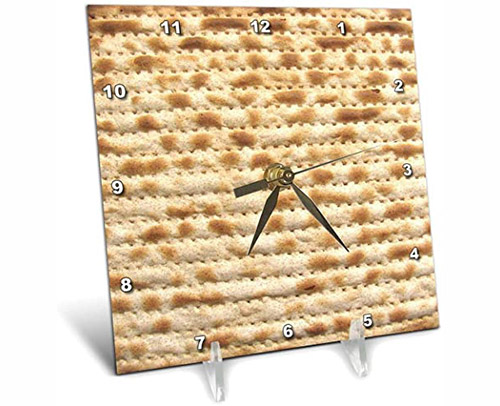
Passover should really begin with the advent of the Jewish month of Nisan. Numerous commentators such as the Rashbam note that Rosh Chodesh Nisan, the first of Nisan, actually marks the beginning of the redemption from Egypt.
In fact, the Haggadah contemplates the recitation of the exodus starting on the first day of Nisan by asking “Yachol meRosh Chodesh,” perhaps we should begin the mitzvah of retelling the story of our freedom from Egypt at the beginning of the month of Nisan.
It was on that day, the first of Nisan, that God gave the first mitzvah to the Jewish people, of sanctifying the new moon each month. From that day onward it became the responsibility of the Jewish people to determine when each new month begins and thereby take control of when holidays are to occur.
Rabbi Yitzhak Mirsky, author of “Hegyonei Halacha,” comments that this day marks the true deliverance from Egypt. Once the Children of Israel gained control over their own time, the real transition from slavery to freedom has begun.
Rabbi Shmuel Goldin in his “Unlocking the Torah Text” points out that it’s not an accident that the first mitzvah our forefathers received focuses on time, and we actually have two Rosh Hashanahs, two beginnings of the year. One in Tishrei and one in Nisan.
The Rosh Hashanah in Tishrei is a universal holiday, while the one in Nisan is a uniquely Jewish one commemorating our national birth as a people and our taking control of time.
The Borscht Belt comedians always poke fun that Jewish holidays either come late or early but never on time. It seems with Passover that no matter when the holiday is scheduled to commence, we begin celebrating some aspects many hours before it actually begins.
The halacha is very strict that we stop eating chametz before noon on the Eve of Pesach. All other holidays and Shabbos begin at sunset, the start of the new day for us. Why is Pesach different that the ban on chametz starts in the late morning? Rabbi Yitzhok Meir Goodman, author of “And There Was Light,” discovered in the 1916 edition of the Encyclopedia Britannica that the Egyptians were the first to discover modern bread-baking techniques, having perfected the art of bread-making using wheat, spelt, barley and oats, four of five grains that Jewish law states produces the possibility of chametz. By Torah law, rice flour or potato starch, for example, can’t become chametz. Thus it seems our chametz prohibitions are directly related to the grains the Egyptians used to bake bread. From the Torah in Bereishit we also see how the Egyptians venerated bread by not eating it with the Hebrews.
The question arises as to why we stop eating or owning chametz before noon before Passover even begins, and why does the Torah declare war on chametz, with so many restrictions of not even owning it and subjecting those who eat it to being cut off from the Jewish community, a rather harsh treatment that would logically be a minor sin.
Rabbi Goodman points out that there are many ways we could commemorate the Exodus, but yet Hashem chose the ban on chametz to teach us that despite Egypt being in the vanguard of culture and civilization, they were also in the forefront of brutally enslaving and killing our people and being the first to invent a systematic persecution of the Jews. To this we declare “Refine your ethics, not your menus. We can live without your great discovery as long as we wish… That week it will be treated like an abomination, like your other gods. And that is why we will not use chametz on our altars as a meal offering (Vayikra 2:11).”
Furthermore, we start the ban on chametz at the beginning of the Egyptian day, which, the Meiri writes, begins at the arrival of the Egyptian sun god, in the center of the day, which happens before noon.
We purposely start off not eating chametz on the Egyptian calendar and time, at the beginning of the Egyptian anniversary when the exodus began, and we end the prohibition on Jewish time, on the 21st of Nissan in the evening, with the Torah, stressing ba-erev. Though we start Pesach on Egyptian time, we end it as free people based on Jewish time.
It is interesting to note that on the seventh day of Passover, the Torah relates that the Jews saw that Mitzrayim meit al sefat hayam, that Egypt died on the edge of the sea. It states Egypt, not the Egyptians, died to teach us that finally the vestiges of Egyptian culture was being expunged from the Jewish people.
Chametz teaches us the value of time. The Maharal notes that since it takes time for dough to rise and for it to bake into bread, the bread is “enslaved” to time. Unlike matzah where the quicker it’s made the better, it’s only a minute (past 18 minutes to be exact) that separates chametz and matzah, between life and death, and between holiness and the profane. We have to seize the moment.
Time is determined by the Jewish people. We are not the subjects of time, but it’s subject to us. Many people seek to pass the time, basically they pass over time, making time their master. Passover is the time to declare that we are indeed the masters of time.
Rabbi Zev Brenner is president and CEO of America’s leading Jewish broadcasting company, Talkline Network, and host of its flagship program “Talkline with Zev Brenner,” which airs on WABC 770 AM, WOR 710 AM, WSNR 620 AM & WLIR 107.1 FM. He is founder of the daily 9:15 minyan at Congregation Hechal Moshe (The Vorhand Shul) in Manhattan and the Original 8:30 AM Minyan at the Young Israel of Long Beach.











